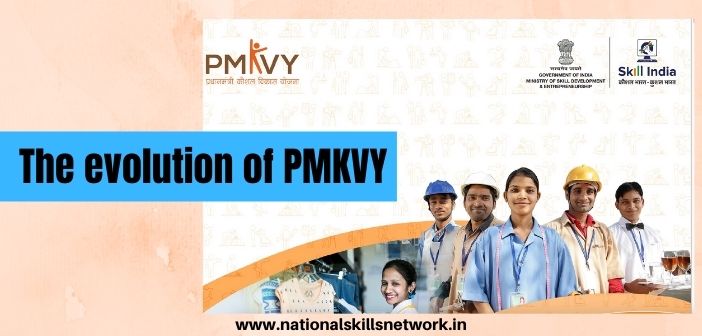This article is based on the inputs, summarized from the conversation with Mr Sanjeev Sharma, President, Empower Pragati.

In Pradhan Mantri Kaushal Vikas Yojana (PMKVY), Training Partners (TPs) have been playing a pivotal role in enabling a large number of youths to become employable. PMKVY is a flagship program by the Ministry of Skill Development and Entrepreneurship (MSDE) and is implemented by National Skill Development Corporation (NSDC).
In January 2021, the third phase of the program (PMKVY 3.0) was launched in 600 districts making 300+ skill courses available to the youth. The scheme now focuses on demand-driven skill development and entrepreneurship promotion at the district level.
The District Skill Committees (DSCs) and State Skill Development Missions (SSDMs) will play a crucial role in implementing PMKVY 3.0. They will address the skill gaps by assessing the demand at the district level. In this backdrop, the role of the training partners will undergo few changes.
Also read: PMKVY 3.0 to focus on strengthening District Skill Committees (DSC) for demand-driven skill training https://nationalskillsnetwork.in/pmkvy-3-0-to-focus-on-strengthening-district-skill-committees-dsc/
You can watch our conversation with Mr Sanjeev Sharma on our YouTube channel, for which the link is given below.
You can also watch the conversation in Hindi on our YouTube channel, for which the link is given below.
The evolution of PMKVY – the flagship skill development scheme from Government of India
Empower Pragati has been offering PMKVY courses through PMKK centers in various districts. The scheme has undergone crucial changes based on the learnings from the implementation and its outcomes.
PMKVY 1.0 was launched on 15th July 2015. It was certificate-driven and about 20 lakh students were trained under the scheme. The aim was to train students and provide them with certificates that would add value to their career. The certificates helped the students to get a job in reputed industries. It was not mandatory to place the candidates through wage or self-employment and the placements were not tracked.
PMKVY 2.0 was employment-driven and over one crore students were trained under the scheme. The students were trained for the various schemes of the government such as Make in India, Skill India and Swachh Bharat. Besides it focused on other government schemes that had opportunities for employment. The placements were tracked and measures were put in place for flawless implementation.
 While PMKVY 1.0 was certificate-driven and PMKVY 2.0 was more employment-driven, the third phase, i.e, PMKVY 3.0 centers on demand-driven skill development. The training will be provided at the district level through PMKKs and the focus will be on industry 4.0. Bigger training centres will be operated under PMKKs for a longer period of time. It aims to train about 8 lakh people and will be implemented in a more decentralized manner.
While PMKVY 1.0 was certificate-driven and PMKVY 2.0 was more employment-driven, the third phase, i.e, PMKVY 3.0 centers on demand-driven skill development. The training will be provided at the district level through PMKKs and the focus will be on industry 4.0. Bigger training centres will be operated under PMKKs for a longer period of time. It aims to train about 8 lakh people and will be implemented in a more decentralized manner.
District Skill Committees and State Skill Development Missions will play a pivotal role in the successful implementation of the short-term trainings and RPL. SSDMs will work alongside DSCs focusing on how to match the requirements in the local industries and provide training on specific district/state level job roles.
PMKVY 3.0 will be focusing more on the grassroots level and will try to stop forced migration by creating jobs at the district level. The government has decided to spend Rs. 948 crores on PMKVY 3.0.
SANKALP and PMKVY 3.0
SANKALP is a World Bank funded program and designed to strengthen skilling at the district-level. It ensures the skill development of SC/ST, women and PWDs and provides skill training in the district and state specific job roles. The trainings under the scheme are short term with a duration of three to six months.
The district-level approach in PMKVY 3.0 makes the scheme similar to SANKALP. Under PMKVY 3.0, the roles of TPs have changed and DSCs will help TPs in various aspects of skilling like mobilization.
The impact of Covid-19 on Training Partners
Covid-19 has already impacted many training partners in the last nine months. There are major transformations in the way the training used to be done. Digitalization has taken over and online training, blended learning has replaced the classroom training method. And technology has made it possible for the entire skilling ecosystem to continue skilling despite all the adversities. Going forward, technology will play a pivotal role in the way the training is being done.
Along with the digital adoption, the pandemic has also taught the students to be self-resilient. The Atmanirbhar Bharat Scheme by the government has encouraged the training partners to provide programs on entrepreneurship. The projects were launched to teach students about entrepreneurship and to motivate them to become self-employed.
The adverse situation during the pandemic helped the entire skilling ecosystem to look beyond possibilities.
The way forward…
The rapid transformations in the skilling ecosystem will benefit all the stake holders in the skilling industry. Through the schemes like PMKVY 3.0, the government will continue the skill development of the students. With blended learning being the new normal, technology will continue to disrupt the skilling ecosystem.













